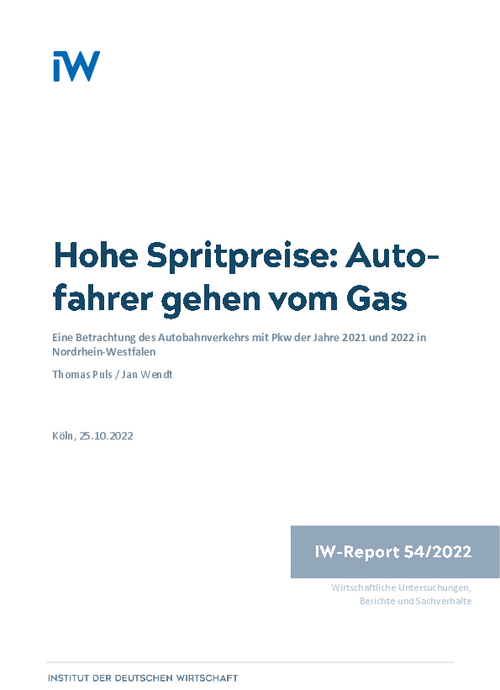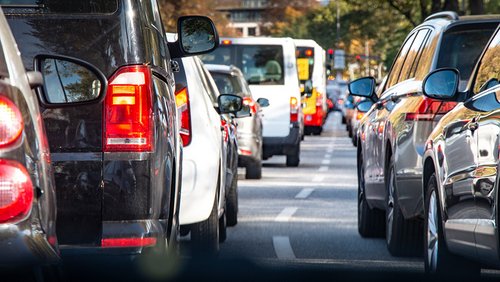In recent months, Germany has been confronted with a price shock for fuels. After years of low pump prices, there have been sudden price increases. In order to capture the effects of the price shock on mobility in North Rhine-Westphalia, various data sources are used as indicators in this report.

How is traffic reacting to high fuel prices?

In recent months, Germany has been confronted with a price shock for fuels. After years of low pump prices, there have been sudden price increases. In order to capture the effects of the price shock on mobility in North Rhine-Westphalia, various data sources are used as indicators in this report.
A clear reaction can be seen in toll road freight traffic, which fell below the previous year's level after the start of the war. On the other hand, mobility data derived from mobile communications data showed much smaller adjustments. Thus, declines in leisure mobility can be identified in March 2022. However, there were then also recovery effects again and this indicator was consistently above the previous year's values.
Finally, highway traffic in North Rhine-Westphalia is analysed using data from the state's automated traffic counting stations. The number of vehicles recorded on a given day and the average speeds they drove are compared for three measurement periods, which are primarily determined by the structure of the data set. The first measurement period covers the period from September 1, 2021 to the start of the war. The second runs from the start of the war to April 11, and the third runs from May 13 to June 3. Between these periods, average fuel prices have increased significantly. In the Pre-war period, gasoline and diesel cost an average of just over 45 cents per gallon less than they did in May. The second measurement period saw the largest price jumps, although gasoline still became slightly more expensive on average in the third period. The price shock initially had a measurable effect on highway traffic. Contrary to seasonal trends, the number of cars record-ed as a daily average fell slightly compared with the pre-war period. The consequences of the high prices were more clearly evident in the average speeds measured. Especially in the off-peak hours, the average speed was about three km/h slower in the second measurement period than in the previous period. This strongly suggests a price-induced behavioural adjustment, since it is precisely in these hours that it is possi-ble to choose one's speed freely and it can be assumed that the weather conditions in measurement period two were more favourable for faster driving. However, these effects did not last - as was already evident in the general mobility data. In the third measurement period, the effects of the average increase in fuel prices were more than offset by other considerations. This was particularly evident again in the speeds driven, which were significantly above the level of the pre-war period.
Overall, the available data primarily reflect a short-term adjustment effect to the high fuel prices. Although traffic volumes and speeds in May 2022 were lower than in late summer 2021, a period comparison, which is currently being prepared, will provide more precise information.

How is traffic reacting to high fuel prices?

More on the topic

Compendium 5.4: CO2 Regulation of Road Transport in Europe
With the Compendium CO2 Regulation in Europe, the IW has been providing the interested public with a comprehensive collection of data on the development of CO2 emissions from passenger car traffic in the European Union, as well as on the applicable regulatory ...
IW
The Transformation of the Automotive Industry: An International Comparison of Germany's Innovation Performance
The automotive industry is undergoing a comprehensive technological transformation that is challenging established value chains. Making sure that domestic research helps to shape this ongoing transformation is therefore an important task for countries with a ...
IW